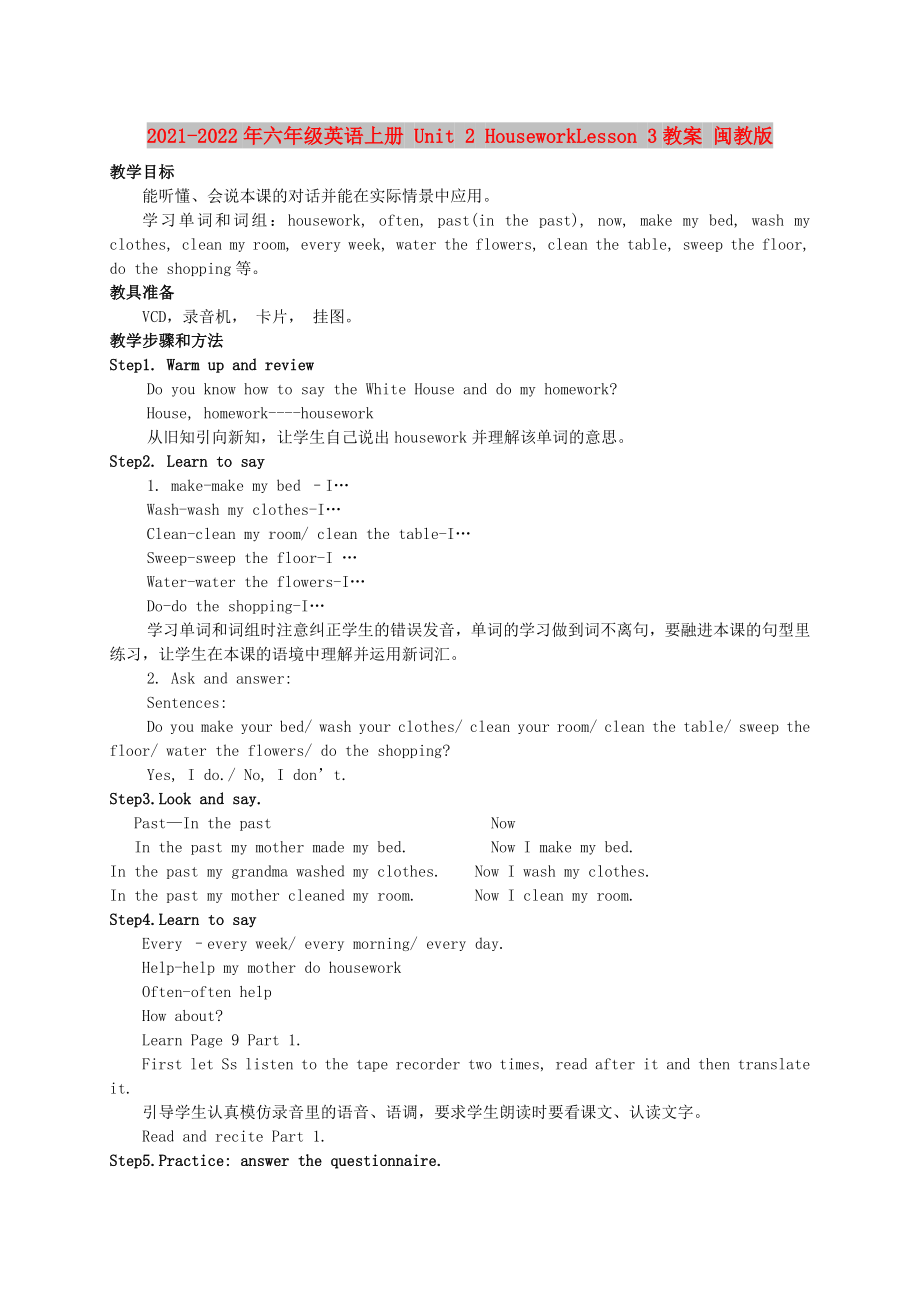《2021-2022年六年級英語上冊 Unit 2 HouseworkLesson 3教案 閩教版》由會(huì)員分享���,可在線閱讀,更多相關(guān)《2021-2022年六年級英語上冊 Unit 2 HouseworkLesson 3教案 閩教版(3頁珍藏版)》請?jiān)谘b配圖網(wǎng)上搜索��。
1��、2021-2022年六年級英語上冊 Unit 2 HouseworkLesson 3教案 閩教版
教學(xué)目標(biāo)
能聽懂�、會(huì)說本課的對話并能在實(shí)際情景中應(yīng)用。
學(xué)習(xí)單詞和詞組:housework, often, past(in the past), now, make my bed, wash my clothes, clean my room, every week, water the flowers, clean the table, sweep the floor, do the shopping等。
教具準(zhǔn)備
VCD�����,錄音機(jī)��, 卡片�, 掛圖�����。
教學(xué)步驟和方法
2��、
Step1. Warm up and review
Do you know how to say the White House and do my homework?
House, homework----housework
從舊知引向新知����,讓學(xué)生自己說出housework并理解該單詞的意思。
Step2. Learn to say
1. make-make my bed –I…
Wash-wash my clothes-I…
Clean-clean my room/ cl
3��、ean the table-I…
Sweep-sweep the floor-I …
Water-water the flowers-I…
Do-do the shopping-I…
學(xué)習(xí)單詞和詞組時(shí)注意糾正學(xué)生的錯(cuò)誤發(fā)音����,單詞的學(xué)習(xí)做到詞不離句,要融進(jìn)本課的句型里練習(xí)����,讓學(xué)生在本課的語境中理解并運(yùn)用新詞匯����。
2. Ask and answer:
Sentences:
Do you make your bed/ wash your clothes/ clean your room/ clean the table/ sweep the floor/ water the flow
4�����、ers/ do the shopping?
Yes, I do./ No, I don’t.
Step3.Look and say.
Past—In the past Now
In the past my mother made my bed. Now I make my bed.
In the past my grandma washed my clothes. Now I wash my clothes.
In the past my mother cleaned my room. Now
5�、I clean my room.
Step4.Learn to say
Every –every week/ every morning/ every day.
Help-help my mother do housework
Often-often help
How about?
Learn Page 9 Part 1.
First let Ss listen to the tape recorder two times, read after it and then translate it.
引導(dǎo)學(xué)生認(rèn)真模仿錄音里的語音、語調(diào)�,要求學(xué)生朗讀時(shí)要看課文、認(rèn)讀文字����。
Rea
6、d and recite Part 1.
Step5.Practice: answer the questionnaire.
Tick the housework you do.
( ) I make my bed every morning.
( ) I clean my room every week.
( ) I wash my clothes.
( )I help my mother do the shopping.
( )I clean the table after dinner.
( ) I sweep the floor.
( )I water the flo
7�����、wers.
Step6.Summary.
Step7.Homework:
1.聽錄音��,模仿對話并在實(shí)際情景中加以運(yùn)用�����。
2.完成《活動(dòng)手冊》上的活動(dòng)。
附送:
2021-2022年六年級英語上冊 Unit 2 HouseworkLesson 4教案 閩教版
教學(xué)目標(biāo)
能聽懂����、會(huì)說本課的小短文。
學(xué)習(xí)單詞和詞組:messy, a messy boy, clean his bedroom, every morning, on Sunday等�。
教具準(zhǔn)備
VCD,錄音機(jī)�, 卡片, 掛圖����。
教學(xué)步驟和方法
8���、
Step1. Warm up and review
Past—In the past Now
In the past my mother made my bed. Now I make my bed.
In the past my grandma washed my clothes. Now I wash my clothes.
In the past my mother cleaned my room. Now I clean my
9���、 room.
On Sunday/ Monday/ Tuesday/ Wednesday/ Thursday/ Friday/ Saturday
Kitchen, garden, supermarket, bedroom, sitting room, bathroom, dining room, study.
Step2.Ask and answer these question:
1) Did you have a good time in the summer vacation?
Did you clean your room in the past?
Yes, I did./
10、 No, I didn’t.
2) Do you often clean your room now?
Do you water your flowers every week?
Yes, I do. / No, I don’t.
Step3.Learn to say.
First let Ss read Page 13 part 1 by themselves, then let them ask the teacher questions.
Listen to the tape recorder one time. Read after the teacher.
Step4.
11�����、Listen and circle the right answer:
1. What day is it?
2. What is Sally’s father doing?
3. Where is Sally’s mother?
4. What is Sally washing?
5. Who is cleaning the bedroom?
6. What is Kate doing?
Step5.Learn to write:
Write a short passage about housework.
Step6.Summary.
Step7.Homewor
12����、k:
1.背本單元的單詞和詞組以及第一部分的內(nèi)容。
2.完成《活動(dòng)手冊》上的作業(yè)。
Review 1
教學(xué)目標(biāo)
復(fù)習(xí)一般現(xiàn)在時(shí)第三人稱單數(shù)句型及動(dòng)詞形式的變化規(guī)則���。
復(fù)習(xí)一般過去時(shí)句型及動(dòng)詞形式的變化規(guī)則�。
學(xué)唱歌曲:This Is the Way We Make Our Bed.
語音語調(diào):學(xué)習(xí)英語語調(diào)中的降調(diào)��。
教具準(zhǔn)備:
單詞卡片�����、錄音機(jī)��、磁帶���。
教學(xué)步驟和方法
Step1. Warm up and review
Step2.S
13���、ing a song
“This is the Way We Make Our Bed”
先復(fù)習(xí)單詞和詞組,跟讀歌詞����,最后聽完整的歌曲。然后再學(xué)唱歌曲�����。
Step3.Review some verbs:
Sweep,clean,wash,go,make,get up,have,visit,play,is,go,learn,watch.
(動(dòng)詞的第三人稱及過去式)
Step4.Look and write. (Page18)
Step5.Listen and learn the English sounds.
Step6.Summary.
Step7.Homework:
1.聽聽、讀讀����、學(xué)語音。
2.完成《活動(dòng)手冊》上的作業(yè)��。
 2021-2022年六年級英語上冊 Unit 2 HouseworkLesson 3教案 閩教版
2021-2022年六年級英語上冊 Unit 2 HouseworkLesson 3教案 閩教版

